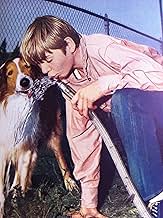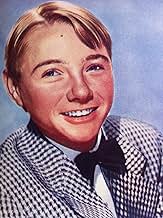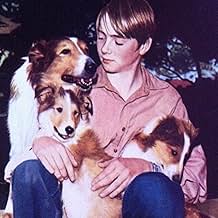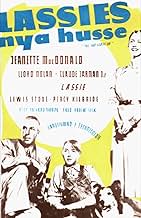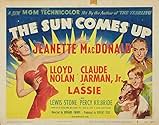Set in the rural south of the United States, a bereaved war widow learns to to put aside her bitterness and grief as she grows to love a young orphan boy and the dog that belonged to her lat... Read allSet in the rural south of the United States, a bereaved war widow learns to to put aside her bitterness and grief as she grows to love a young orphan boy and the dog that belonged to her late son. Punctuated with song-filled interludes.Set in the rural south of the United States, a bereaved war widow learns to to put aside her bitterness and grief as she grows to love a young orphan boy and the dog that belonged to her late son. Punctuated with song-filled interludes.
Ed Agresti
- Musician
- (uncredited)
Jessie Arnold
- Townswoman at Fire
- (uncredited)
Charles Bates
- Orphan
- (uncredited)
Bobby Beyers
- Orphan
- (uncredited)
Barbara Billingsley
- Nurse
- (uncredited)
Paul E. Burns
- Dr. Sample
- (uncredited)
John Butler
- Hotel Attendant
- (uncredited)
Featured reviews
Yes, I know.
I'd never seen it - it was MacDonald's last film - what better way for MGM to say you are a has- been than to make her a "mother" in a Lassie movie. Drek! I prepared to "endure it" for Jeannette's sake.
I was utterly captivated. What a lovely movie - classed up there with Friendly Persuasion in terms of truly loving, and truly honest human emotion. I keep trying to convince myself to pass this along, but I cry too much, it's too real, too human, too GOOD for that. For the lovers of what President Wilson tried to do for the US and what Obama in his footsteps is still unable to do for us, this is what the ideal of the US is as it lives on in ideals, honesty, and right thinking and feeling.
Jeannette has four classical aria/song moments - a French song, a repetition of Puccini's Un Bel Di (Broadway Serenade), Songs My Mother Taught Me, and Romance. Not much to go on, but it doesn't matter. She is fine dramatically, as a war widow , whose son dies and is left alone, but is brought to life by her encounter with an orphan {exceptional performance by young actor, Claude Jarman, Jr.] Her son exits at 10 minutes into the film, young Jarman arrives at 20 minutes.
Lewis Stone is seen briefly as an adviser. Percy Kilbridge is brilliant in a Charles Butterworth role as the local sage. Margaret Hamilton is unforgettable as a fashion-conscious spinster. Poor Lloyd Nolan doesn't arrive until an hour and 3 minutes in, but we know he will anchor the film, as he always did {most successfully in Peyton Place).
Oh, do see it - that dog will melt you as will the story and the deft acting, direction and over-all good intentions of it.
I'd never seen it - it was MacDonald's last film - what better way for MGM to say you are a has- been than to make her a "mother" in a Lassie movie. Drek! I prepared to "endure it" for Jeannette's sake.
I was utterly captivated. What a lovely movie - classed up there with Friendly Persuasion in terms of truly loving, and truly honest human emotion. I keep trying to convince myself to pass this along, but I cry too much, it's too real, too human, too GOOD for that. For the lovers of what President Wilson tried to do for the US and what Obama in his footsteps is still unable to do for us, this is what the ideal of the US is as it lives on in ideals, honesty, and right thinking and feeling.
Jeannette has four classical aria/song moments - a French song, a repetition of Puccini's Un Bel Di (Broadway Serenade), Songs My Mother Taught Me, and Romance. Not much to go on, but it doesn't matter. She is fine dramatically, as a war widow , whose son dies and is left alone, but is brought to life by her encounter with an orphan {exceptional performance by young actor, Claude Jarman, Jr.] Her son exits at 10 minutes into the film, young Jarman arrives at 20 minutes.
Lewis Stone is seen briefly as an adviser. Percy Kilbridge is brilliant in a Charles Butterworth role as the local sage. Margaret Hamilton is unforgettable as a fashion-conscious spinster. Poor Lloyd Nolan doesn't arrive until an hour and 3 minutes in, but we know he will anchor the film, as he always did {most successfully in Peyton Place).
Oh, do see it - that dog will melt you as will the story and the deft acting, direction and over-all good intentions of it.
THE SUN COMES UP (Metro-Goldwyn-Mayer, 1948), directed by Richard Thorpe, is a sentimental drama notable for being both movie featuring the famous collie by the name of Lassie, introduced five years earlier in LASSIE COME HOME (MGM, 1943), and the final movie appearance of opera singer/actress, Jeanette MacDonald. MacDonald has come a long way in movies by this point, making her film debut in THE LOVE PARADE (Paramount, 1929), starring Maurice Chevalier, with whom she teamed in three more musical-comedies. Aside from non-musical works for other studios such as Fox, she found both home and success at MGM starting in 1934, where the studio developed her talents more towards opera, with a new screen partner being Nelson Eddy. By the 1940s, her style of movies began to wane, marking the close for MGM by 1942. In 1948, she returned to the screen, and MGM, this time playing singing-mother roles starting with THREE DARING DAUGHTERS. Whether MacDonald intended on ending her movie career or not with THE SUN COMES UP is uncertain. At least she managed to hold her own against her scene stealing co-stars, especially from the dog named Lassie.
Plot summary: Helen Lorfield Winter (Jeanette MacDonald) is a widowed mother with a teenage son, Hank (Dwayne Hickman) with a collie, Lassie, who adores him. Since the death of her husband, Helen has devoted her time towards her family and home life. A former opera singer by profession, and through the assistance of her manager, Arthur Norton (Lewis Stone), Helen gets her new beginning returning to concert singing for the first time in three years. Her concert proves successful, but her happiness is shattered by the sudden death of her son after getting struck by a passing truck while trying to prevent Lassie from getting hit while on the street. Weeks pass. Helen gives up her career. Unable to be around people, especially children, Helen packs up her belongings to go someplace far away to forget. Though she blames Lassie for her son's death, she takes Lassie with her anyway on a car trip leading her to Bushy Gap, a hillbilly residence located somewhere in the mountains. Helen's new beginning restarts as she rents a furnished home belonging to the out-of-town, Thomas I. Chandler. She soon finds herself disliked by town folks through her attitude towards their children. Through the kindly but blunt assistance of storekeeper, William B. Willigoode (Percy Kilbride), who tells her the truth about herself, Helen's attitude soon changes, especially after meeting with a teenage boy named Jerry (Claude Jarman Jr.). After saving Lassie from a rattlesnake, Helen hires Jerry as her handyboy. Though fond of Jerry, she knows very little about him. It takes her landlord, Thomas Chandler (Lloyd Nolan), having returned from his trip, to let her figure things out for herself. Others in the cast include: Hope Landin (Mrs. Pope); Nicholas Joy (Victor Alvord); Mickey McGuire (Cleaver) and Teddy Infuhr (Junebug).
Not the typical MacDonald movie from the past, THE SUN COMES UP, actually resembles that of an episode from a "Lassie" television series a decade later. Though second billed, Lloyd Nolan comes in 63 minutes into the start of the movie, while Claude Jarman Jr., best known for his performance in THE YEARLING (MGM, 1946), takes up much of the proceedings playing a likable harmonica teenager who bonds well with Lassie. Being more drama than musical, the presence of comical types as Percy Kilbride, Margaret Hamilton and Ida Moore, highlight greatly to its lighter moment. Even MacDonald does a brief comedy turn for one scene involving snuff. Because of MacDonald's reputation as a singer, song numbers are inserted into the story, including: "Un Bel De Vedremo" from Giacomo Puccini's MADAME BUTTERFLY; "Songs My Mother Taught Me" by Antonin Dvorak; Rene Rabey's "Tes Jolies Yeux" "Cousin Ebenezer" (with MacDonald and group of orphan boys); and "If You Were Mine" by Artur Rubenstein.
THE SUN COMES UP may not be a MacDonald favorite for anyone in favor of her singing opposite Nelson Eddy in eight musicals from 1935 to 1942, or working opposite Clark Gable and Spencer Tracy in SAN FRANCISCO (MGM, 1936), but it is satisfactory screen entertainment of MGM's 93 minutes of Technicolor family style mode. Formerly available on video cassette and later on DVD, THE SUN COMES UP, can often be found on the Turner Classic Movies cable channel. (**1/2)
Plot summary: Helen Lorfield Winter (Jeanette MacDonald) is a widowed mother with a teenage son, Hank (Dwayne Hickman) with a collie, Lassie, who adores him. Since the death of her husband, Helen has devoted her time towards her family and home life. A former opera singer by profession, and through the assistance of her manager, Arthur Norton (Lewis Stone), Helen gets her new beginning returning to concert singing for the first time in three years. Her concert proves successful, but her happiness is shattered by the sudden death of her son after getting struck by a passing truck while trying to prevent Lassie from getting hit while on the street. Weeks pass. Helen gives up her career. Unable to be around people, especially children, Helen packs up her belongings to go someplace far away to forget. Though she blames Lassie for her son's death, she takes Lassie with her anyway on a car trip leading her to Bushy Gap, a hillbilly residence located somewhere in the mountains. Helen's new beginning restarts as she rents a furnished home belonging to the out-of-town, Thomas I. Chandler. She soon finds herself disliked by town folks through her attitude towards their children. Through the kindly but blunt assistance of storekeeper, William B. Willigoode (Percy Kilbride), who tells her the truth about herself, Helen's attitude soon changes, especially after meeting with a teenage boy named Jerry (Claude Jarman Jr.). After saving Lassie from a rattlesnake, Helen hires Jerry as her handyboy. Though fond of Jerry, she knows very little about him. It takes her landlord, Thomas Chandler (Lloyd Nolan), having returned from his trip, to let her figure things out for herself. Others in the cast include: Hope Landin (Mrs. Pope); Nicholas Joy (Victor Alvord); Mickey McGuire (Cleaver) and Teddy Infuhr (Junebug).
Not the typical MacDonald movie from the past, THE SUN COMES UP, actually resembles that of an episode from a "Lassie" television series a decade later. Though second billed, Lloyd Nolan comes in 63 minutes into the start of the movie, while Claude Jarman Jr., best known for his performance in THE YEARLING (MGM, 1946), takes up much of the proceedings playing a likable harmonica teenager who bonds well with Lassie. Being more drama than musical, the presence of comical types as Percy Kilbride, Margaret Hamilton and Ida Moore, highlight greatly to its lighter moment. Even MacDonald does a brief comedy turn for one scene involving snuff. Because of MacDonald's reputation as a singer, song numbers are inserted into the story, including: "Un Bel De Vedremo" from Giacomo Puccini's MADAME BUTTERFLY; "Songs My Mother Taught Me" by Antonin Dvorak; Rene Rabey's "Tes Jolies Yeux" "Cousin Ebenezer" (with MacDonald and group of orphan boys); and "If You Were Mine" by Artur Rubenstein.
THE SUN COMES UP may not be a MacDonald favorite for anyone in favor of her singing opposite Nelson Eddy in eight musicals from 1935 to 1942, or working opposite Clark Gable and Spencer Tracy in SAN FRANCISCO (MGM, 1936), but it is satisfactory screen entertainment of MGM's 93 minutes of Technicolor family style mode. Formerly available on video cassette and later on DVD, THE SUN COMES UP, can often be found on the Turner Classic Movies cable channel. (**1/2)
This is a movie that may be a bit corny by modern measure but a wonderful film to sit down with a young child and watch. Old time values--a slice of life with real problems---a happy ending.
Nice, simple family film, a bit dated but still with enough charm and humor to make it agreeable--based on a novel by Marjorie Kinnan Rawlings, author of 'The Yearling'. Jeanette has her bitterness melted by Claude Jarman, Jr. and Lassie when she decides to retreat to the country to forget about the death of her son. An above-average Lassie film with a rather predictable ending after a tense fire sequence in which he rescues Claude Jarman, Jr. from a burning loft. A few nice songs by Jeanette, beautiful settings and some amusing performances by Percy Kilbride, Margaret Hamilton and others. Lloyd Nolan turns up for a cameo role. Pleasant entertainment. The blurb on the VHS copy I have cites a quote from the N.Y. Times which is so accurate: "Simple and sweet...Jeanette MacDonald has never looked lovelier."
This film was Jeanette MacDonald's last film. And, considering it's a nice little family movie, she went out in style.
Helen is distraught. Her son has just died and she has decided to retreat to the countryside to try to forget. This is made tougher because the boy's dog refuses to leave her and she reluctantly takes the dog along with her. Through the course of the movie, Helen becomes friends with an orphan boy, Jerry (Claude Jarmin Jr.) and the woman who wants to be alone and forget soon learns to live again.
This film is less a Lassie film than most. Sure, the dog's important to the story...but the humans are more important and he's more a supporting player. Overall, very engaging and a nice story that you are sure to enjoy....and made with the usual MGM style and flair.
Helen is distraught. Her son has just died and she has decided to retreat to the countryside to try to forget. This is made tougher because the boy's dog refuses to leave her and she reluctantly takes the dog along with her. Through the course of the movie, Helen becomes friends with an orphan boy, Jerry (Claude Jarmin Jr.) and the woman who wants to be alone and forget soon learns to live again.
This film is less a Lassie film than most. Sure, the dog's important to the story...but the humans are more important and he's more a supporting player. Overall, very engaging and a nice story that you are sure to enjoy....and made with the usual MGM style and flair.
Did you know
- TriviaThe Sun Comes Up (1949) is mainly based on the 1936 short story "A Mother in Mannville" by Marjorie Kinnan Rawlings. According to the University of South Carolina Libraries description of Rawlings' works, in 1946 MGM asked Rawlings to do a story that could star Lassie with Claude Jarman Jr.. Rawlings started with her 1936 short story "A Mother in Mannville." MGM bought the rights to Rawlings' unpublished story "A Family for Jock," re-titled it "Mountain Prelude," and sold the literary rights to The Saturday Evening Post. The story appeared The Post as a six-part serial during April 26 to May 31, 1947. But it has never been published in novel form.
- GoofsWhen Jerry finally decides to go play with Lassie, we can hear someone off-screen give Lassie a command. Right after Jerry says,"Let's have fun now," and hugs Lassie, a man's voice clearly speaks a word off-camera, and Lassie looks in that direction before running off with the boy.
- SoundtracksUn Bel Di
(uncredited)
from "Madama Butterfly"
Music by Giacomo Puccini
Libretto by Luigi Illica and Giuseppe Giacosa
Sung by Jeanette MacDonald
Details
- Release date
- Country of origin
- Language
- Also known as
- Prolećno sunce
- Filming locations
- Production company
- See more company credits at IMDbPro
- Runtime1 hour 33 minutes
- Aspect ratio
- 1.37 : 1
Contribute to this page
Suggest an edit or add missing content



